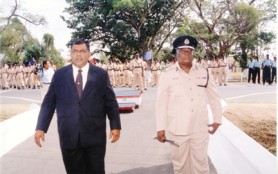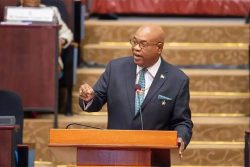Minister of Legal affairs and Attorney General Mr Charles Ramson and Minister of Home Affairs Mr Clement Rohee both reacted animatedly to remarks made by outgoing Assistant Com-missioner of Police Paul Slowe earlier this month. Slowe spoke at several farewell functions – at the headquarters of ‘A’ Division in Georgetown and ‘B’ Division in New Amsterdam both of which he commanded and the traditional farewell parade at Eve Leary where he spent several years as Commander of the Tactical Service Unit. He was also interviewed by the Stabroek News.

The wide reporting of his remarks in the daily newspapers might have irritated the administration. Mr Ramson wrote of Slowe that “His refusal to accept re-assignment ranks [was] an illegal act, assuming, but not conceding, that he could lawfully refuse the direction of the Minister.” The Ministry of Home Affairs published a statement accusing Slowe of sowing “seeds of dissatisfaction and disunity among the members of the Guyana Police Force” and condemned his behaviour in the “strongest possible terms.” The ministry claimed that Slowe may be guilty of “dereliction of duty” because he had “tacitly admitted that matters of improper conduct and other infringements allegedly committed by ranks were brought to his attention but he failed to take action as a senior police officer.”
Mr Slowe did a lot of talking at all of these events indeed. In an extensive interview with Stabroek News, he told of “blatant corruption” by some members of the Force who were guilty of “…brutalizing people and behaving as if they are a law unto themselves…” something he thought had gotten out of control.
He said that the Force had to be stripped of rogue elements from top to bottom before its image could be repaired. There was much more. In the final analysis, his comments centered on two important points about the present predicament of the Guyana Police Force – first about the challenge of political interference and, second, about the need for organisational reform to counter the wave of professional decadence.
Political interference
Mr Slowe felt that his confrontation with former Minister of Home Affairs Ronald Gajraj who held office from 1999 until he was forced to resign in 2005 was responsible for his not being promoted to higher ranks. In fact it was worse than a personal disadvantage for Slowe; it was a professional disaster for the Force. It became an important test case that exemplified the level of political interference in the professional administration and operations of the Police Force which has had consequences for the quality of policing up to the present day.
As the story went, newspapers of the day reported that a shooting incident occurred on March 30, 2003 at Rosignol Village, on the West Coast of Berbice which fell under the Force’s ‘B’ Division commanded at that time by Assistant Commissioner Paul Slowe. A young man had been shot by a private firearm holder; an investigation was launched and, as a result, the police seized the firearm. It was discovered that another firearm was in the house of the alleged assailant and, therefore, not one but two weapons – a .32 pistol and a 9 mm pistol – were seized to be tested to determine which one was used in the incident.
The next day, even before the police had commenced a proper investigation or the weapon had been secured, Slowe received an enquiry from an official of the Ministry of Home Affairs about the matter. The Minister of Home Affairs personally telephoned the Divisional Commander at this stage to inquire why both weapons were seized. He then asked when the firearm would be returned to which Slowe replied that he could not be sure since the matter was still being investigated. Slowe refused to release the weapon until he was instructed by the then Acting Commissioner of Police Mr Floyd Mc Donald – his professional superior.
The Commissioner asked the Divisional Commander to apologise to the Minister for his effrontery but Slowe declined to do so unless he could be advised “in writing” about the nature of his alleged wrongdoing. What should have been a pro forma, police investigation at the local level eventually escalated into a national issue which threatened the foundation of professional policing. President Bharrat Jagdeo then asked to see the refractory officer who maintained that he would not apologise unless he could be convinced that he had done something wrong
Slowe was then sent a letter from Police Headquarters on April 29 signed by Assistant Com-missioner Henry Greene directing him to relinquish command of ‘B’ Division and to assume duty as Director of the then non-existent Financial Investigation Unit at the Ministry of Finance. Slowe declin-ed to take up the fake appointment and sought recourse to the courts.
Senior Counsel Rex McKay and Attorney-at-Law Winston Murray challenged Slowe’s transfer contending that the Commissioner’s directive was “in bad faith, arbitrary, in contravention of the Constitution of Guyana, the Police Act and the rules of the Police Service Commission.” Justice Jainarayan Singh, after an ex parte hearing, issued an order directing the Acting Police Commissioner “to show cause” why the decision to remove Slowe should not be quashed. The Commissioner against whom the injunction was issued never entered a defence and, when he demitted office and a new Commissioner was appointed, Slowe withdrew the matter. He was then transferred to George-town as the Commander of ‘A’ Division.
Slowe said he was convinced that the challenge to Gajraj contributed to his never having been promoted thereafter. In fact, since the retirement of former Deputy Commissioner Edward Wills last year, the Force has between without a deputy commissioner. The establishment provides for four deputy commissioners and he had been performing the duties of deputy Commissioner (Opera-tions).
Organisational reform
In Mr Ronald Gajraj’s heyday as Minister of Home Affairs, public safety in this country came under the combined pressure of armed robberies, arson, contraband-smuggling, gun-running, money-laundering, narcotics-trafficking, kidnapping, massacres, prison escapes, death squads and drug gangs. With the outbreak of the troubles on the east coast Demerara in 2002, it became evident that several serving and former policemen had been recruited into a ‘Phantom Gang’ run by the notorious drug lord Shaheed ‘Roger’ Khan. Slowe bemoaned the fact that Khan and his gangsters, who have been accused of committing a number of murders, did “terrible damage” to the image of the Guyana Police Force.
It was during the troubles that President Bharrat Jagdeo personally promulgated a menu of measures to improve the Police Force’s crime-fighting capability. Paul Slowe was selected to be a member of the Task Force on Organisation Change, established by the Police Force itself, aimed at reforming policing. Under Mr Gajraj, however, funding was never provided, the officers were assigned to different duties and reform languished. The process restarted when Winston Felix was appointed Commissioner and Slowe was identified to be the “change manager.” Among his recommendations was that a few rogue officers and ‘rotten eggs’ be offered the option of resigning. His reasoning was that he “didn’t think if they had remained in the system that we were going to be able to make the type of changes that would have been able to turn the system around.” His surgical recommendation was never accepted and both he and the reform process were sidelined after Felix retired.
Failure to reform the Police Force was one of the most important factors in the administration’s failure to quell the upsurge in crime. To make matters worse, several damaging decisions have aggravated the Force’s problems over the years. One factor was the appointment of Prime Minister Samuel Hinds as Minister of Home Affairs in 1998 and the appointment of attorney-at-law Jairam Ronald Gajraj as Minister of Home Affairs in 1999.
Another factor was the decision to extend the service of former Commissioners Laurie Lewis, Floyd McDonald and Henry Greene long after they had passed the statutory age of retirement. The practice of retaining superannuated Commissioners who the administration favoured prevented many trained and talented younger officers from reaching the top position. Evidence existed that other officers who had been accused of misdemeanours, particularly, involvement in illegal migration schemes and extra-judicial kill-ings, were protected from prosecution. These practices led to significant demoralisation of the Force’s senior commanders.
Slowe said it was high time for members of the Guyana Police Force to adhere to the Force’s code of conduct and professional standards. He argued that police officers at all levels of the Force should not allow themselves to be used as “toys” in a political game. “We, as police officers, are law enforcers. Many times, we may feel that the justice system is inadequate to deal with situations…. but we can’t break the law to enforce the law,” he said.
Paul Slowe’s farewell orations, though uncommon for a retiring senior police officer and despite criticisms from at least two ministers, have not been without merit. A reformed Police Force – free from overbearing political interference and administered on professional principles – is the best law-enforcement strategy that the administration could implement. The Ministry of Home Affairs and the Police Force itself would do well to reflect on Mr Slowe’s wordy pronouncements.








